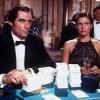Poker game analyzed-does it make sense?
#1

Posted 08 May 2007 - 04:40 PM
1. When the 4th community card (4th Street)is dealt, Bond cannot lose and would have to know that;
2. Both Bond and LeChiffre have very questionable opening hands;
3. Someone, probably the large African gentleman should have bet rather than checked after 4th Street was revealed;
4. As far as I can tell, LeChiffre badly misplays this hand based on what he knows.
My detailed analysis of the game is set forth below. First, it appears from the betting order that Bond is the small blind and that the Asian gentleman (henceforth abbreviated "A") is the large blind. The initial cards dealt to each are as follows (code: Bond = Bond; A = Asian man B = equals large black guy L = LeChiffre [no I am not a racist, but I don't know the character's names] For cards, the first is the rank and the letter in parenthesis is the suit, e.g. H = hearts)
Bond: 5 (7)7 (S)
A: K (S) Q (S)
B: 8 © 8 (H)
L: A © 6 (H)
We don't get to see the betting but all players stay in. I would note that A and B would be expected to stay in with their hands (particularly since A is the big blind and there's no penalty). LeChiffre's hand is one that most players would not play. Bond's hand is marginally better than LeChiffre's but would ususally not be played, although since Bond is the small blind he is only risking half a bet to see the flop (assuming no raises on this round).
Now the flop:
A (H) 8 (S) 6(S)
Again we don't get to see the betting but A now has both a potential flush and a potential straight. B is looking very good with hidden trips (three of a kind). L has two pair aces and sixes which is not that strong a hand but whether he stays in or not would probably depend on the signals he received from the bettting, which, unfortunately (though understandably for movie pacing) they don't show us. Bond now has a potential straight, a potential flush, or a potential straight flush and the nature of the signals received from the betting would probably dictate whether he stays in or not.
Now, 4th Street: 4 (S), which makes the Board
A (H) 8 (S) 6 (S) 4 (S)
Bond: has now hit his straight flush. He absolutely cannot lose this hand and has to know it by this point. There is no possible combination of cards that can beat him. He checks, presumably to lure LeChiffre into calling a subsequent all in raise (known as the "check raise" strategy). A has made his flush. He checks, which is surprising, because there are possible hands which could beat him with this board. I would have expected him to bet to try to uncover other players' real strength. B: Still stuck at trips. Lots of possible hands could beat him and I would think a good player would definitely bet to try to determine if anyone is likely to beat him. L: Still stuck at 2 pair, he might check to get a free card and see if he can make his full house, and that is what he does.
5th Street (also known as the River): A (S)
Bond: Still has a straight flush. Checks to lure the other players in.
A: Now has an Ace high flush, a slightly better flush than his previous flush but not significantly better. He goes all in with plenty of potential hands that could beat him and no idea from the betting whether those hands are out there. I'm not impressed.
B: hits a full house 8's and Aces. Goes all in. Has to know that both a higher full house and a straight flush are out there and could beat him. Easier to justify than A's going all in without any betting to give him signals but somewhat questionable in my view. L: has hit a full house Aces and 8's. He raises to 12 million. At this point he should know that he could be beaten by a straight flush or, and this is important, a higher full house. It is possible another player could be holding an Ace and an 8 in which case L loses to an Aces and 8's full house. Given that two players have gone all in that would have to be a serious possibility. So, L raises to 12 million, a reasonable play to test whether Bond has a higher full house or a straight flush, although a questionable gamble with respect to A and B. Bond goes all in for 40 million (after all he can't lose) and L calls him. This seems like a major error on L's part. Not because he loses, which happens, but because he calls Bond when he knows there are at least two hands which are possible which could beat him, and Bond appears to be check raising him. So although Bond appears to play the hand well after he hits his straight flush (I'm not sure the odds indicated he was playing it well before the screenwriters dealt him one) L seems to me to be playing a very dumb game of poker. Anyway, I got a kick out of breaking this down (even dealt the hands out) and I'm quite the average amateur so if anyone else who's a poker buff has any thoughts on this, I'd be interested.
#2

Posted 08 May 2007 - 04:54 PM
#3

Posted 08 May 2007 - 05:03 PM
#4

Posted 08 May 2007 - 05:04 PM
1) LeChiffre played 9-2 off-suit the first hand of the game. Who plays that? He must've had an incredible hunch.
2) Bond's final hand. I believe he checks once he hits the straight flush. Why check? There's no way possible he can lose (I think you mentioned this).
#5

Posted 08 May 2007 - 05:27 PM
A couple things that I noticed.
1) LeChiffre played 9-2 off-suit the first hand of the game. Who plays that? He must've had an incredible hunch.
2) Bond's final hand. I believe he checks once he hits the straight flush. Why check? There's no way possible he can lose (I think you mentioned this).
to get better value on the hand I suppose. He must have thought someone had a strong hand...anyway, it's hard to break down a fictional game. Plays are often determined by the circumstances, player personalities..etc. Interesting thread btw MHazzard. I'm sure poker pros think the movie has an element of cheese but that's ok. It's not made for pros but rather to be audience friendly. But...Bond's big "mistake" which broke him out wasn't such a bad play; an all in call with A high fh? Not bad at all...I'd call that every day and twice on sunday.
#6

Posted 08 May 2007 - 06:40 PM
Yeah, this does seem to be pretty stupid, especially if Bond did check the round before. All that checking followed only by calling is either the sign of a complete novice (which Le Chiffre knows Bond is not) or someone afraid of scaring away a sure thing.This seems like a major error on L's part. Not because he loses, which happens, but because he calls Bond when he knows there are at least two hands which are possible which could beat him, and Bond appears to be check raising him.
However, for all the flaws of each player's strategy, I can forgive the unrealistic liberties taken. First of all, it's a movie which isn't even about the game, and I know they have to use it, usually in pieces (like the final hand), to build suspense and provide an interesting new battlefield for the hero and villain to duke it out.
Secondly, aside from the good guys (Bond & Leiter) and bad (Le Chiffre, at the very least), the participants are obviously multimillionaires, probably billionaires (involved with criminal syndicates and political dynasties, no doubt) who don't mind throwing around "a little" money, despite being relatively intermediate players. The thrill of the game and status associated with the ability to even participate is payoff enough for some of the losers, so making suboptimal choices isn't as big a deal for them.
Lastly, I can partially excuse Le Chiffre's errors as the result of a man who's finally started to sweat and fear his quite possibly impending death, thanks to the persistence and resourcefulness of this man, Bond. Even the most mathematically astute card players sometimes fall victim to the psychological warfare, as I would contend Le Chiffre did.
That said, although I think those are all good rationalizations, I would have preferred they weren't necessary.
Well, I think only the straight flush was really that much of a monster hand, and although the likelihood of all four remaining players having such good hands at the same time is slim, it's something one does see every so often in poker tournaments. Plus, this is a movie, so one in a million odds are routine.Well, anyone who plays poker on a semi-regular basis will tell you that they had near-impossibly flawless hands. *Just* the ones that could beat each other. Though I'm glad Bond won on a straight flush than say, a royal flush. That would have ruined the game, IMO.
It's a check-raise, intended to lure Le Chiffre in for the kill. The only thing I'd be surprised by is if Le Chiffre fell for it twice, as the OP suggests was a possibility. Agreed about the 9-2, though.1) LeChiffre played 9-2 off-suit the first hand of the game. Who plays that? He must've had an incredible hunch.
2) Bond's final hand. I believe he checks once he hits the straight flush. Why check? There's no way possible he can lose (I think you mentioned this).
Agreed.But...Bond's big "mistake" which broke him out wasn't such a bad play; an all in call with A high fh? Not bad at all...I'd call that every day and twice on sunday.
#7

Posted 08 May 2007 - 07:04 PM
1) LeChiffre played 9-2 off-suit the first hand of the game. Who plays that? He must've had an incredible hunch.
[mra]The big blind might play that. Don
#8

Posted 08 May 2007 - 07:06 PM
I see, but it must take some serious skill (and restraint) to not bet on a straight flush. I'm not playing in games for $150 million, but if I were to catch a straight flush, I'd at least bet something. That's just me, and that's probably why I'm not a professional.It's a check-raise, intended to lure Le Chiffre in for the kill. The only thing I'd be surprised by is if Le Chiffre fell for it twice, as the OP suggests was a possibility. Agreed about the 9-2, though.
#9

Posted 08 May 2007 - 07:37 PM
Actually, I agree.I see, but it must take some serious skill (and restraint) to not bet on a straight flush. I'm not playing in games for $150 million, but if I were to catch a straight flush, I'd at least bet something. That's just me, and that's probably why I'm not a professional.It's a check-raise, intended to lure Le Chiffre in for the kill. The only thing I'd be surprised by is if Le Chiffre fell for it twice, as the OP suggests was a possibility. Agreed about the 9-2, though.
#10

Posted 09 May 2007 - 01:03 AM
#11

Posted 09 May 2007 - 04:17 PM
Actually, I agree.I see, but it must take some serious skill (and restraint) to not bet on a straight flush. I'm not playing in games for $150 million, but if I were to catch a straight flush, I'd at least bet something. That's just me, and that's probably why I'm not a professional.It's a check-raise, intended to lure Le Chiffre in for the kill. The only thing I'd be surprised by is if Le Chiffre fell for it twice, as the OP suggests was a possibility. Agreed about the 9-2, though.
I think checking would be far too suspicious given those circumstances, and Bond could have bet without running Le Chiffre out of that hand. He's lucky Le Chiffre was overconfident or wasn't thinking straight.
What gets me is not that Bond checks twice, because it would make sense for him, once he knows he has an unbeatable hand, to try to lure LeChiffre into going all in, since his goal is not just to make money (in which case he might bet and try to get players to drop out) but to bankrupt LeChiffre. Why no one else bets and/or raises when they would seem to be urgently in need of the information this provides is, however, still puzzling. In any case, I am fully aware that this is a fictional game, requiring dramatic constraints, so we should probably be grateful that it makes any sense at all. In fairness to the screenwriters, it's no worse than Flemings tendency to give Bond improbable winning hands, natural or otherwise in baccarat. I think the most interesting fact, and the one that got me going analyzing this in the first place was the realization that Bond had to know he couldn't lose before LeChiffre lays down his cards. That's what made me want to watch the scene again to see what Craig's mannerisms indicated, if anything. By the way, I'm very much the amateur poker player but most of my analysis of Hold Em Strategy comes from Phil Helmuth's very readable book "Play Poker Like the Pros". I'm also working on Doyle Brunsons "Super System 1" which is also good but much harder to digest. Anyway, thanks for all your very interesting comments so far.
#12

Posted 09 May 2007 - 04:23 PM
Same goes for Le Chiffre--in tournament poker, in the final stages, A-6 is not that bad a starting hand. Tournament poker is a different animal--everything is compressed. At a regular game, if the cards aren't running your way, you can go home and come back the next day. In a tournament, you have to "make a move" sometimes with cards that you normally wouldn't play. As a result, luck plays a bigger part in tournament poker than in regular "grinder" games.
#13

Posted 09 May 2007 - 05:46 PM
From an entertainment standpoint, assuming the majority of the audience aren't really that familiar with the game, it does kind of milk the suspense when Bond flips his cards ("Oh, look! He only has a 5 and 7 and the bad guy has an ACE! Bond loses! Oh ...wait a minute!"). The dealer does make a considerable effort to spell it out.
#14

Posted 09 May 2007 - 05:51 PM
#15

Posted 09 May 2007 - 06:03 PM
I thought Bond limped in as one of the two blinds which is a reasonable play. He saw a board that agreed with him potentially and stayed in, got the nuts and won. I didn't think he was cocky or self satisfied. I didn't see a Roger Moore-Brosnan-esque look of absolute belief that I will win because I'm Bond and I never loose. And I like that he didn't gloat or say something like "oops" or turn his cards over the way Le chifre showed the JJs. I think he felt the knot in his stomach and was just relieved to win. I liked that about this new Bond. He behaves like a real person but is still cool as we want him to be.
#16

Posted 09 May 2007 - 06:14 PM
#17

Posted 09 May 2007 - 06:15 PM
#18

Posted 09 May 2007 - 06:19 PM
#19

Posted 09 May 2007 - 06:56 PM
Nice analysis. The only thing I'd point out is the varying chip stacks at the table, and the fact that we don't know what the blinds are. The two besides LeChiffre that went all in with losing hands may have been about to be blinded out, and were unlikely to see as strong a hand in the near future.
Same goes for Le Chiffre--in tournament poker, in the final stages, A-6 is not that bad a starting hand. Tournament poker is a different animal--everything is compressed. At a regular game, if the cards aren't running your way, you can go home and come back the next day. In a tournament, you have to "make a move" sometimes with cards that you normally wouldn't play. As a result, luck plays a bigger part in tournament poker than in regular "grinder" games.
A good point about this being a tournament game and one I hadn't considered in terms of playing weaker hands than one might otherwise. In response to some other postings I am assuming based on betting order that Bond was the small blind and the Asian gentleman next to him was the big blind, although I think (someone correct me if I'm wrong) that if this was being played normally, Bond having been called by LeChiffre would be the first not the last to lay down his hand, but I excuse dramatic necessity for this.
#20

Posted 09 May 2007 - 07:08 PM
...although I think (someone correct me if I'm wrong) that if this was being played normally, Bond having been called by LeChiffre would be the first not the last to lay down his hand, but I excuse dramatic necessity for this.
You are obviously not familiar with Montenegrin rules.





